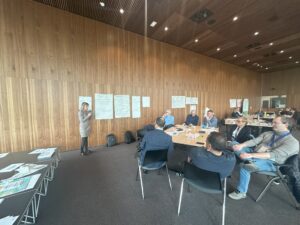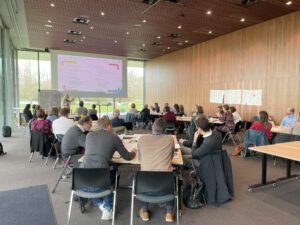Leading Culture Shift
Achieving culture shift in large multinational organisations is a big challenge, but exactly the kind of challenge I love!
When Ulrich Irgens (pictured below) stepped in as General Manager of Gnosis to maximise the potential of this 450 pax sub-division of Lesaffre, he knew he needed to take a 3-pronged approach:
1.Define a compelling purpose backed by a clear and ambitious growth strategy
2.Embed a customer and brand focus that delivers measurable value to customers and consumers
3.Build a constructive culture where people are supported to grow, develop, collaborate, innovate and embrace change
 Ulrich engaged me to help him on his third pillar to create the shift from a traditional top-down culture to more empowered, dynamic and agile ways of working.
Ulrich engaged me to help him on his third pillar to create the shift from a traditional top-down culture to more empowered, dynamic and agile ways of working.
Together we designed a 3-year transformation program that involves culture & leadership measurement using Human Synergistics diagnostics, as well as annual conferences, regional workshops, and online group coaching.
The main lever for change is the leadership group – the top 35 leaders who lead departments and sub-groups across the globe. Their engagement and commitment to leading by example and delivering initiatives that support change.
This week we had our second 3-day culture immersion in Lille, France. Our first immersion in December 2024 was to define our ‘ideal culture’ and set a target for change. This week, 36 leaders from around the world converged to review results of their global culture survey and define actions for change.
Our main insights were:
✅Take time to talk about culture with teams. It is as important as talking about the work to be done.
✅ Build trust necessary to create accountability. Without trust, people avoid conflict and decision making.
✅Help people understand how what they do matters to customers and colleagues. In large, distributed organisations- this is not always obvious.
✅Constructive cultures are critical to growth – we need people to feel capable, responsible, supported and safe to take the risks necessary to push boundaries
✅Build confidence and capability to give and receive feedback, have constructive conflict, and coaching. These skills empower people to live up to their values and the values of the organisation. 
Importantly, we took time to connect socially and have some fun. Social connection activities are essential in building relationships and forming the social bonds that support more open and constructive conversations. Probably the most fun was Battle Kart where we discovered a few “unknown” speed demons in our midst!
The energy and enthusiasm of this group was palpable! I am looking forward to the road ahead and, in partnership with the Global Head of People & Culture, Marie-Josee Dorlencourt, supporting them to land this ambition!

